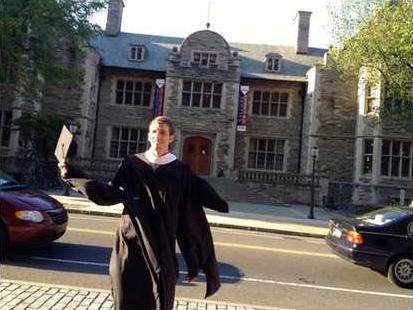We were in Philadelphia last week for our son Talmadge’s graduation at the University of Pennsylvania. He did his master’s degree in a relatively new field called "positive psychology." The curriculum centered on studies of what creates well-being and what contributes to genuine human “flourishing.” Our whole family has benefited as Tal has shared his favorite readings, references, teachers and authors.
Graduations are always a joyful time, particularly for parents, and this one, shared with Tal’s wife and little daughter, was spectacular. The ceremonies were held in the traditional old brick U. Penn football stadium on a perfect spring day. Grammy winner and Penn graduate John Legend was the commencement speaker, and he spoke on the concept of measuring our success in terms of love rather than riches or career success.
One outgrowth of the experience was that it got us thinking about the need for more “positive psychology” in the world of raising and coaching children. A lesson that too many parents and too many coaches never learn is that criticism and demands do not motivate. Encouragement and praise do.
We’ve all seen it — a coach berating a player, or criticizing something he did, or sarcastically asking him if he couldn’t just throw the ball away a few more times. With all of our basketball-playing sons over the years, we have seen more negative, critical coaching than we care to remember. It makes the opposite — positive, praise-oriented coaching — all the more noticeable and appreciated when it happens. (Pete Carroll of the world champion Seattle Seahawks comes to mind, as well as a couple of wonderful, positive coaches who our boys loved — and played their best for.)
And we see so many parents falling into the same negative, pushy, critical mode. We see them at the playground: “Come on. Don’t be so scared all the time. It's easy. Look at that little kid over there. You’re much bigger than him, and he can do it.”
We see it with homework: “Hey, it's not that hard. You should be able to do this with your eyes closed. What’s taking you so long?”
We even see it with character traits, where it may be the most harmful of all: “Why are you so lazy?” or “Why can’t you tell the truth for a change?”
We certainly had our own problems with this — particularly with our older kids. Actually, it was me (Richard) who mainly had the problem. For example, I pushed some of our older children a bit too much in sports. I remember it with skiing and tennis. The more I pushed, critiqued and corrected them, the worse they got. Some of the younger kids mostly escaped the dad-coach simply because I didn’t have the time. And they turned out to be the best skiers and tennis players. They just watched the older ones and learned on their own without a dad correcting them every minute. When I noticed how good they were getting and told them, they got even better.
We are happy to say that our kids, now parents themselves, are figuring this out earlier than we did. We see a lot of positive psychology in their parenting of our grandchildren, and we love it.
The bottom line is that praise works better than criticism. Praise empowers and loosens kids up. Criticism intimidates and ties them up in knots.
False praise and flattery don't do much good. Neither does giving every kid on every team a trophy and telling all of them that they are great ballplayers. But genuine praise — even if it is just for trying hard or showing up — can go a very long way indeed.
And the motivation that comes from an appreciative, positive, loving parent can be what fuels kids with the confidence necessary to find and become their best selves.
ARTICLE ENDNOTE: Richard and Linda Eyre are New York Times No. 1 best-selling authors who lecture throughout the world on family-related topics. Visit them anytime at EyresFreeBooks.com or at valuesparenting.com, and follow Linda’s blog at eyrealm.blogspot.com.
Positive psychology can work wonders
Linda and Richard Eyre





